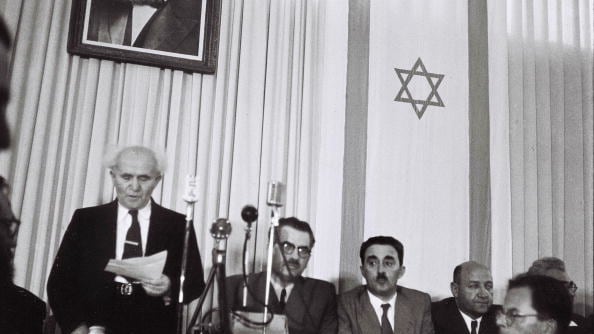Yousef Munayyer is right that a productive discussion about how to resolve the Israeli-Palestinian conflict is necessary. But it should also be an informed discussion. Advocates for a one-state solution to the conflict often lose sight of this, as they seek to realize Palestinian rights, security, and freedoms. The key piece of information they ignore or gloss over is the fact that most Israeli Jews simply don’t want to live in a state with millions more Palestinians.
It is true that some of the more politically-astute settler leaders have moved in this direction, and that some on the far left have concluded it’s the only fair solution. But apart from the fact that the settler idea of a single state is not one in which Palestinians will have many collective or political rights, this completely ignores the fact that most Israelis want nothing like a one-state solution, because it represents the end of the Zionist dream. And Israel was specifically created to realize that very dream.

Drawing on Theodor Herzl’s famous line, Munayyer argues that for all intents and purposes a single state is already here and it’s governed oppressively by Jews. Making a single state official and legal would be better for everybody, and while it wouldn’t necessarily be the Zionist dream, it wouldn’t be a nightmare, either. It would just be, as the only solution to the conflict.
Munayyer writes: “the idea that Israelis and Palestinians are fundamentally incapable of ethno-religious coexistence under an agreed upon system of rules in a single state because of who they are—even though countless ethnic and religious groups coexist peacefully in democracies—is unimaginative at the least, if not offensive.” I don’t see how it’s offensive. Surely the history of the Middle East teaches us that cramming separate groups into a single entity against their will is the worst possible way of creating states.
But more importantly, it is precisely the imagination of the Jewish state—a separate nation-state for the Jewish people, with an underlying Jewishness—that was the dream. Munayyer has it backwards, then: it’s because of who they are that Jewish Israelis don’t want to live in a non-Jewish state. That’s why a single state isn’t a dream or a nightmare—it’s just a daydream.
The most recent survey of the Israel Democracy Institute provides further data. 72.9 percent of Israeli Jews feel “to a large and very large extent” part of the State of Israel and its problems, while 17.2 percent feel “to some extent.” 89.1 percent of Jews feel very proud or quite proud of their “Israeliness.” In case one wonders whether Israeliness might incorporate a diminished element of Jewishness (i.e., a one-state solution), the following figures tell a different story: 45.3 percent of Israeli Jews consider themselves “very Zionist”; 36.4 percent consider themselves “quite Zionist” (only 5.3 percent consider themselves “not at all Zionist”). When asked about the specific nature of the state itself, 11.7 percent considered it “very Zionist,” and 44.6 percent believed it to be “quite Zionist.” 33.5 percent said they felt “not so Zionist” and 7.7 percent said “not at all Zionist.”
At first glance this might appear to offer hope for a one-state solution, but that conclusion is undermined by the fact that most of these last two groups are composed of haredim and religious Zionists. As the survey concludes, “there is reason to assume that the haredi-leumi camp, who define themselves as Zionist to a greater extent than all the groups, see Israel as not Zionist in the sense of ‘not Zionist enough,’ while the ultra-Orthodox, who classify themselves mostly as non-Zionist, evidently do not view the state’s (perceived) lack of Zionism as a negative trait”; that is, because they’d rather see a state based on halacha than anything else.
Yes, current conditions—with Israeli occupation and bouts of random and organized Israeli and Palestinian violence—are terrible. But given how Israeli Jews feel about the purpose and nature of the state, all the evidence indicates this would only get worse if one state was imposed on everybody.
Finally, a one-state solution assumes that critiquing the actions of one side (Israel) opens the door to thinking it’s legitimate to undermine their rights and needs while promoting that of the other side (Palestine). We are right to avoid forcing the occupation on Palestinian forever; why would we not also be right to avoid imposing the end of their state on Israeli Jews?






